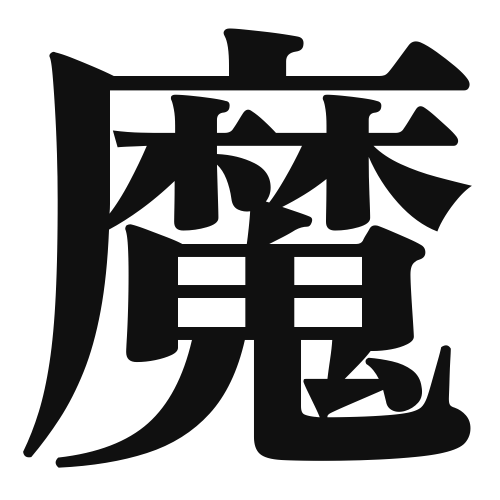1. Overview of Meaning
The kanji “魔” (ma) generally means “magic” or “sorcery.” It often refers to supernatural powers or phenomena that are beyond the ordinary understanding of the world.
2. Formation and Radical
Formation of the Kanji: The kanji “魔” is a phonetic-ideographic character (形声文字). It combines the radical for “demon” (鬼) on the left, which suggests something evil or supernatural, with the phonetic component “麻” (ma) on the right, which contributes to its pronunciation.
Radical: The radical of “魔” is 鬼 (oni), which means “demon” or “ghost.” This radical indicates the kanji’s association with the supernatural and the mystical.
3. Examples of Usage
Common Words and Phrases: Some frequently used words that include “魔” are:
- 魔法 (まほう, mahō) – magic
- 魔女 (まじょ, majo) – witch
- 悪魔 (あくま, akuma) – demon
Example Sentences in Daily Conversation:
- 彼女は魔法を使うことができると言っていた。
(She said she could use magic.) - その映画には魔女が登場する。
(The movie features a witch.)
4. Synonyms and Antonyms
Similar Kanji: A kanji with a similar meaning is “妖” (yō), which refers to “mysterious” or “bewitching” beings, often with a more feminine connotation. While “魔” emphasizes the idea of magic and sorcery, “妖” leans more towards the enchanting and alluring aspects of the supernatural.
Opposite Kanji: A kanji that represents the opposite meaning is “聖” (sei), which means “holy” or “sacred.” While “魔” is associated with evil or supernatural forces, “聖” denotes purity and divinity.
5. Cultural and Historical Background
Relation to Japanese Culture: The concept of “魔” is deeply embedded in Japanese folklore and mythology, where various magical beings and spirits play significant roles in stories and traditions.
Proverbs and Idioms: One common expression is “魔が差す” (まがさす, ma ga sasu), which means “to be tempted by evil” or “to be possessed by a sudden impulse.” This phrase reflects the cultural understanding of the influence of supernatural forces on human behavior.
